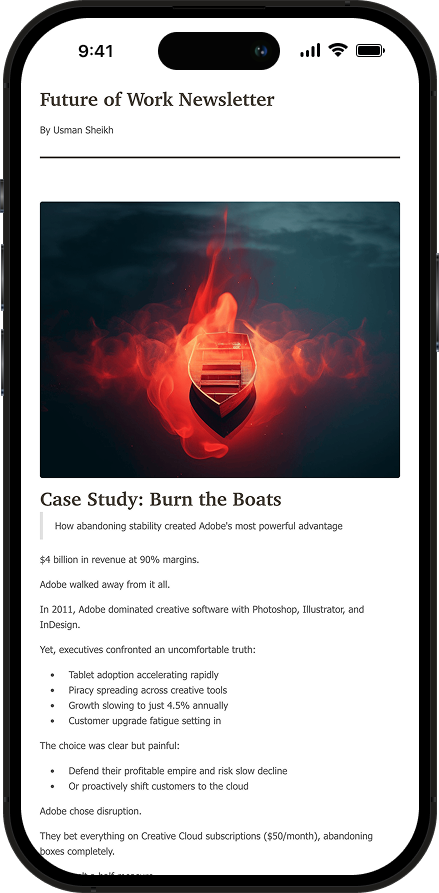28 Mar 2025
Reinventing Dell, Again
How the company improved revenue per employee by 98% to ($885K)
Dell cut 25,000 jobs in two years.
Then something unexpected happened.
Revenue per employee shot up 15% - not from simple math, but from key decisions which are reshaping how technology companies operate.
Revenue per employee since 2017:
→ Dell Technologies: $885K (Up 98% from $446K)
→ Hewlett Packard Enterprise: $494K (Up just 13%)
→ Cisco: $595K (Down 10%)
→ IBM: $214K (Essentially flat)
This dramatic improvement didn't happen by accident. To understand how Dell achieved this transformation, we need to look at their history of reinvention.
Dell's previous pivots:
→ 1984: Direct-to-consumer PC revolution
→ 1996: E-commerce pioneer with $1M/day in sales
→ 2013: $24.4B privatization escaping public markets
→ 2016: $67B EMC acquisition for enterprise presence
→ 2021: VMware spin-off to focus on core infra
→ 2022-2025: AI rebuild with workforce efficiency
How did Dell go from 133,000 employees to 108,000 while continuing to grow revenue?
To answer this question, I looked through their latest filings. Three key strategies emerged:
-
AI-Optimized Infrastructure Economics
→ Delivering 2-4x margins with AI servers
→ Reducing labor for higher-value infrastructure sales
→ Creating more value with less human intervention
-
Surgical Business Focus
→ Concentrating on Infrastructure Solutions Group
→ Growing AI-optimized server business by 22-38%
→ Exiting or downsizing lower-productivity segments
-
Organizational Simplification
→ Eliminating entire management layers
→ Streamlining decision-making processes
→ Maintaining output with substantially fewer people
The implications extend beyond Dell.
What we are seeing is a shift where revenue growth no longer directly correlates with headcount growth - breaking a pattern that's persisted in tech for decades.
Tech companies now face a clear choice:
→ Continue with labor-intensive models or
→ Embrace technology-driven productivity
At its core, this represents a fundamental shift in how value gets created in technology companies.
The most valuable skills increasingly involve orchestrating technology rather than simply operating it.
